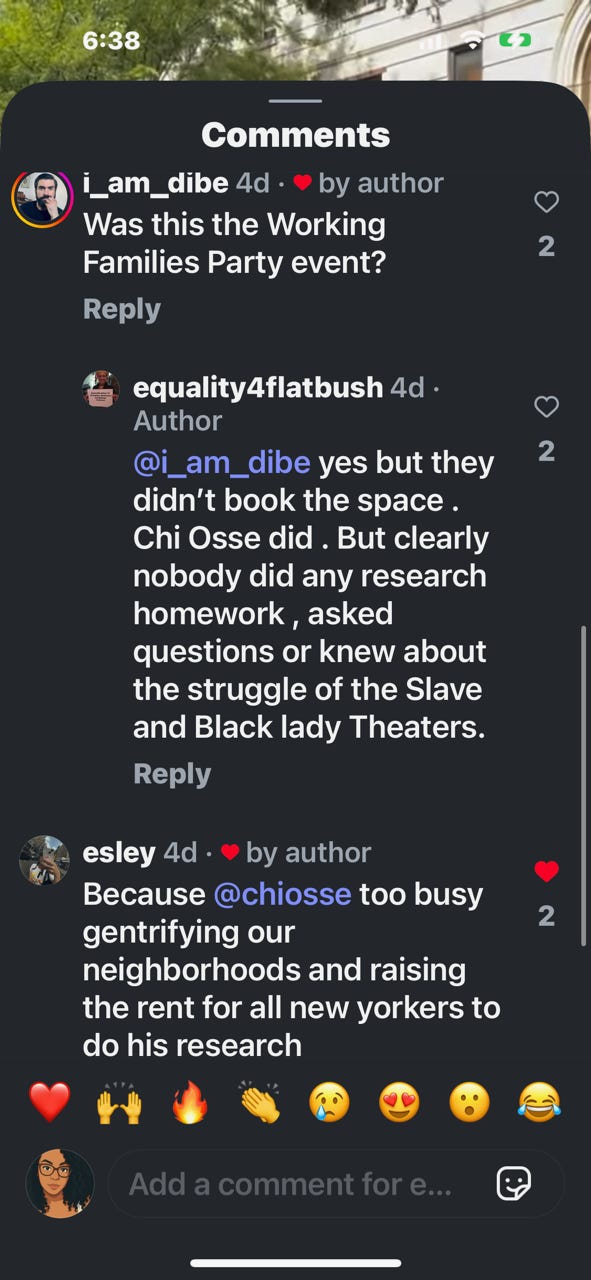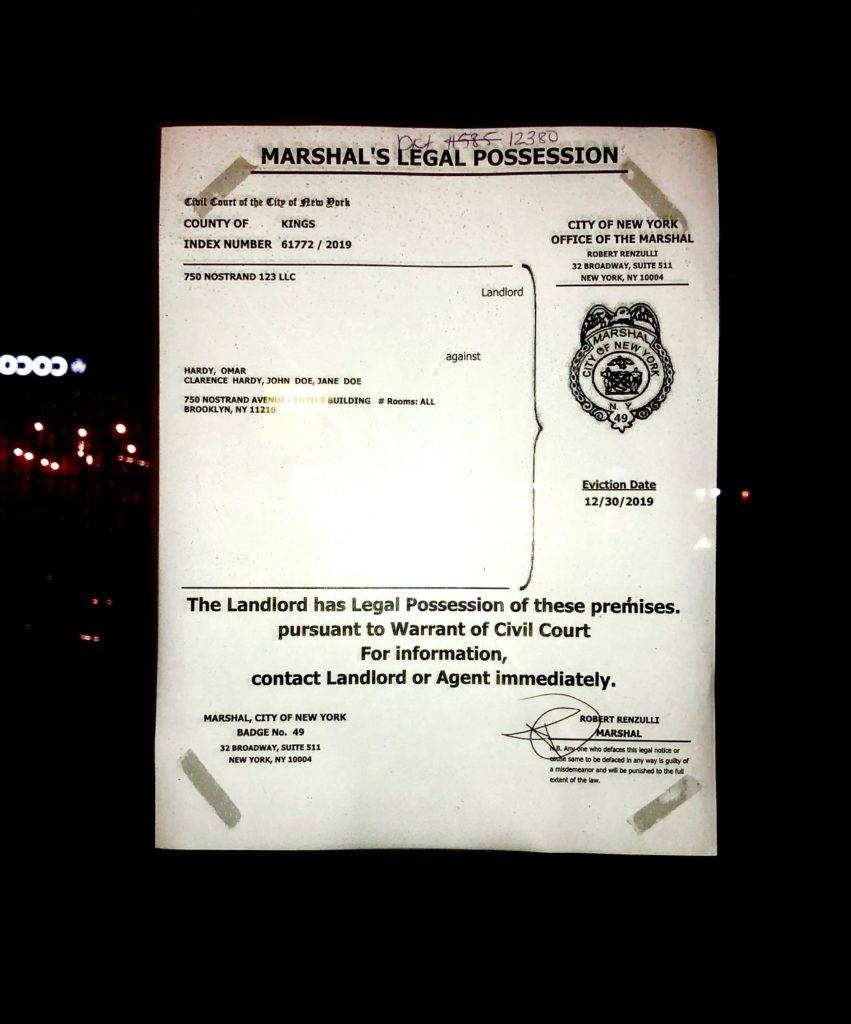“If you didn’t know, now you know.” — Biggie Smalls
750 Nostrand Ave. is more than an address. It’s a cultural landmark. It’s where Black creativity, activism, and legacy have taken root for decades. It’s the home of The Black Lady Theatre — or was, until it became the site of yet another chapter in Brooklyn’s bitter struggle against deed theft and displacement.
On Sunday, June 22, 2025, the New York Working Families Party brought the mayoral hopefuls to Crown Heights for a high-energy “Unity Rally” at the Crown Hill Theatre, ironically the same building long known as The Black Lady Theatre. But as political banners went up and press microphones flicked on, so did the resistance.
A Rally Becomes a Protest
Chief Minister Omar Hardy, son of the late cultural steward Clarence Jr. 2X Hardy Shabazz, learned about the rally just hours before it started. With supporters by his side, posters in hand, and memories in mind, he arrived at the venue not to celebrate, but to resist.
Many rally attendees didn’t realize they were entering a contested space, one that community members say was stolen from them through deed fraud and systemic neglect. For Hardy and his supporters, the rally became an unintentional symbol of how easily Black history is erased — and how little some of our elected officials are willing to do to stop it.
State Senator Zellnor Myrie, a Crown Heights native, reportedly chose not to attend in solidarity with the Hardys. State Senator Jabari Brisport told Hardy, “Let’s get it back.” Zohran Mamdani, the Democratic nominee for mayor, engaged directly and promised a sit-down. NYC Public Advocate Jumaane Williams gave Hardy the most time, acknowledged the theatre’s history, and committed to follow up.
Others simply walked past.
What is the Black Lady Theatre?
Founded in 1984 by Judge John L. Phillips Jr., the Black Lady Theatre was more than a performance space. It was a sanctuary — a hub for arts, activism, financial literacy, and cultural healing. It hosted stage plays, concerts, poetry slams, documentary screenings, wellness workshops, and community meetings. The Black Lady Theatre was home to Black Star Studios, where Mos Def and Talib Kweli recorded their debut album, and the stage for many Civil Rights leaders, including those who got their start. It was where history was made and came alive.
Thousands walked through its doors. Its mission was simple but revolutionary: to serve as a cultural stronghold for learning, resistance, and the preservation of African heritage.
The Fight for Ownership
The theatre closed in 2020 after a court battle left the Hardy family locked out, despite having owned and operated the building since 1999.
According to the Hardys, they were never notified about a foreclosure. Instead, 750 Nostrand 123 LLC — reportedly backed by developer Mendel Gold — took the property via a tax lien auction, paying $3.5 million for what began as a $23,000 debt.1
Worse, the Hardys were labeled as tenants in court filings, despite being the rightful owners. They were dragged into housing court, not foreclosure court. A judge initially ruled in their favor, then that decision mysteriously vanished from the record. The same judge later reversed herself — a move legal experts call highly irregular.
As Omar Hardy said outside Housing Court: “They’re trying to erase us from history. You’re asking us to take away 30 years in 30 days.”2
Despite widespread public outcry, the judge denied the Hardys' motion to reclaim the theatre. Their legal fight continues in the state appellate court and possibly in federal court.
While the Hardy family’s case is still pending, Mendel Gold has since been charged in an unrelated matter. In 2022, he was charged with multiple felonies related to defrauding New York City’s 421-a tax program, following an investigation by the NYC Department of Investigation, according to a press release from Manhattan District Attorney Alvin L. Bragg Jr. The charges include grand larceny, tax fraud, and offering false instruments for filing.3
The Bigger Picture: Deed Theft in Brooklyn
Brooklyn isn’t just the backdrop — it’s the epicenter of New York City’s deed theft epidemic.
Deed theft occurs when properties are fraudulently transferred using forged documents or predatory practices, often targeting elderly or Black property owners. The result? Families are evicted. Generational wealth is erased. Neighborhoods are transformed.
And Crown Heights, Bed-Stuy, and East New York are ground zero.
A major driver of the crisis: New York City’s tax lien sale system. Reintroduced this year for the first time since the pandemic, it allows the city to sell tax debts to private investors. These investors can stack on fees and eventually foreclose. Over 26,500 properties are on the 2025 list — many in Black and brown communities.4
“Black homeowners are six times more likely to be on the lien sale list than comparable white homeowners,” says Kevin Wolfe of the Center for NYC Neighborhoods. “This is not an equitable solution — it’s predatory.”
The Cultural Toll
Deed theft isn’t just a financial crime. It’s a cultural catastrophe.
The loss of The Black Lady Theatre — a space created to honor and uplift Black culture — and the emergence of a new venue called ‘Crown Hill Theatre,’ operating at the same address but entirely unrelated, is more than a simple name change. It’s an attempt to obscure the history of the site. The original murals have been destroyed, and the cultural memory tied to the space has been systematically stripped away, making it harder for the community to trace what was lost.
Deed theft doesn’t just take property; it takes entire legacies — especially Black legacies — and makes them disappear. In their place, we’re left not only with silence, but with confusion. And what happened here is not an isolated case. Across the city, longtime Black homeowners are seeing their properties taken through similar schemes — deeds transferred without consent, homes lost without warning.
Deed theft doesn’t just take property; it steals memory, identity, and belonging.
Where Do We Go From Here?
The fight is far from over. Advocates are demanding:
An immediate end to the tax lien sale system.
Robust investigations and prosecutions of fraudulent property transfers.
Legal aid, restitution, and public accountability for deed theft victims.
Organizations like Equality for Flatbush, Black Coalition for Homeowners, and The Black Lady Theatre Collective are educating residents, fundraising for legal fees, and organizing grassroots defense.
The Hardys are continuing their legal fight and calling for public pressure on elected officials, especially those who campaign in Black neighborhoods while ignoring their cultural loss.
Join the Fight
Sign the petition at Change.org: Save The Black Lady Theatre
Follow and support organizations like @equality4flatbush and @theblackladytheatre.
Watch the documentary regarding the theft of the Black Lady Theatre by clicking here.
Call your City Council representative and demand that they oppose the tax lien sale.
Share this story. Attend rallies. Stay loud.
Omar Hardy quote from press statement outside Brooklyn Housing Court, 2021.
Manhattan DA press release (2022): “Developer Mendel Gold Indicted in 421-a Fraud Case.
NYC Department of Finance 2025 Lien Sale List (public records).
Kevin Wolfe, Center for NYC Neighborhoods, in a 2024 report: “Disparities in Lien Sale Listings by Race.”








Good stuff!! Keep it up Cyn🙏🏽🙌🏽